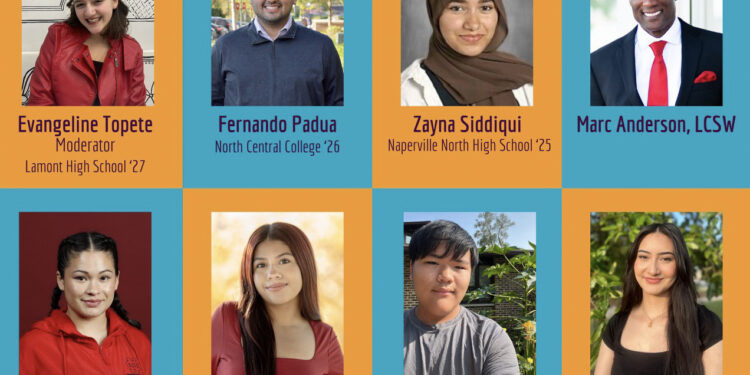
Fernando Padua and Sufiyah Siddique know what it feels like to grow up in a household where mental health isn’t really talked about. Where what’s going on in their heads wasn’t necessarily something they could easily bring up at the dinner table.
They also know it’s a feeling shared among many BIPOC — Black, Indigenous and People of Color — youth. That’s why they’re actively working to change the narrative.
On Wednesday, an inaugural panel event focused on the mental health of BIPOC youth will be staged at Naperville’s North Central College — thanks to Padua, Siddique and other young students from in and around Naperville, who spent their summer organizing the first-time gathering.
The event, called “Our Voices, Our Minds: BIPOC Youth Navigating Mental Health,” will take place at North Central’s Wentz Science Center from 5:30 to 8:15 p.m. It will feature both a panel discussion as well as a community resource fair.
The event is free and open to all, though it will primarily be directed towards youth, their families, educators and community organizations. Live music and a variety of entertainment — a henna station and the chance to take part in an affirmation wall, for instance — will also be woven into programming Wednesday.
The goal is to create an event that is a testament to the intersection of mental health and culture, organizers say. They imagine a night that leaves attendees feeling energized and, beyond that, supported.
“I want it to be alive,” Siddique, 17, said. “I don’t want it to just be a plain conference. And it’s not going to be like that. We’re talking about mental health, but you’re also there to enjoy yourself and learn about other cultures.”
“I really hope that everyone and anyone who attends,” Padua, 20, added, “can walk away feeling like they have a community surrounding them. … You know, a community of support and the feeling that they’re empowered.”
Siddique, a senior at Naperville North High School, and Padua, who is in his third year at North Central College, are two of six local student leaders that have been the driving force behind Wednesday’s event. The other young organizers on the event’s planning committee hail from Lewis University in Romeoville, Aurora University and Lemont High School, plus a few more representatives from Naperville North and North Central.
The panel and community fair has been an undertaking months in the making.
The venture started out of a youth arm of the Naperville-based nonprofit Alliance of Latinos Motivating Action in the Suburbs, or ALMAS. Back in the spring, a pair of youth leaders within the organization started toying with the idea of creating an event that was led by youth and organized by youth, explained ALMAS president Lili Burciaga.
From there, the notion took off. Their efforts quickly focused on BIPOC youth after conversations early on into planning kept drawing them in that direction, Burciaga said.
“So many of the experiences that our two young (ALMAS) leaders were talking about when it comes to mental health (centered around) cultural, bicultural and multicultural experiences,” Burciaga said.
Racial and ethnic minorities and American Indian/Alaska Native populations experience numerous mental health disparities, according to the U.S. Department of Health and Human Services Office of Minority Health. Disparities can be a function of several factors, including financial hardship, limited access to cultural and linguistically appropriate service and stigma surrounding mental health care.
Wanting their event to be as representative as possible, ALMAS started reaching out to other young BIPOC leaders in the area who might be interested in joining the planning team. That’s how Siddique and Padua got involved.
Siddique, who was born and raised in Naperville, heard about the opportunity to participate through a high school leadership program. She was immediately interested.
Recalling an initial meeting she had with ALMAS and other young organizers, Siddique said that she was struck by how much they shared similar experiences and challenges with mental health despite coming from different backgrounds.
“I’m someone of Indian background — I’m Muslim – and I just remember we talked about how mental health is not really talked about in households of people of color,” she said. “It’s kind of put to the side, like it’s not a big deal. … We got to share our opinions and how we were so similar even though we had different backgrounds.”
Padua likewise joined the planning committee through connections he’s made as a student leader on North Central’s campus. An innate interest for organizing drew him to the opportunity, he said, but his own upbringing, like Siddique, made ALMAS’ offer a unique chance to help bring together an event that struck a chord personally.
“I have a Mexican background, and in my culture, it’s kind of taboo to talk about mental health,” he said.
Growing up, it was hard at times to navigate his emotions and to articulate those to his parents, especially as the oldest of three siblings, he said. As he got older, he took it as his responsibility to figure out how to manage his own mental health and in turn, how his siblings and parents could do the same.
Padua just started therapy this past summer, he said. He’s been able to imbue lessons he’s learned and challenges he’s faced into the planning process for Wednesday’s event, where he’ll also be a panelist.
“I feel like I’ve really been able to lend my own experiences and knowledge to the event,” he said.
Wednesday’s panel will be filled out by five other local young community members as well as a mental health expert. Discussions will cover topics from family involvement in mental health to bettering access to culturally relevant resources and treatments. The event’s adjoining community fair will have booths from around 15 organizations for attendees to peruse.
Padua, Siddique and Burciaga all said they’re itching to see their night of programming come to life Wednesday. Burciaga especially said she’s “so impressed” with what the event’s youth planning committee has come up with.
She wishes that she had something similar available to her when she was younger.
A first-generation Mexican American originally from the South Side of Chicago, Burciaga said that she often struggled with figuring out her identity growing up. She found herself having to balance cultures but not really having anyone or any platform to help her make sense of what she was going through.
Looking ahead to Wednesday’s event, Burciaga said, “I really think that having something like this and having these conversations when I was younger would have made a really big difference.”
Originally Published:







